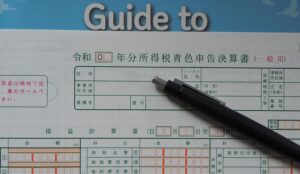Foreigners in Japan are also eligible for housing tax credits.
Last month, the Nation Tax Agency announced roadside prices for 2022.
(“Roadside prices”, Rosen-ka(路線価)in Japanese, are assessed values of lands facing a major road for inheritance tax and gift tax purposes.)
According to it, compared to 2021, the land price has risen the most in Hakuba Village, Nagano Prefecture.
National newspapers reported that the main reason was the increase in foreigners moving there.
Most foreign workers or freelancers may start living in Japan in rental housing as a place to live.
But, as they have lived longer in Japan or have financial leeway, they may start to own their housing.
Today, I will provide an overview of preferential housing-related tax treatment build or acquire a residential building from the perspective of foreigners.
目次(Table of contents)
Foreigners residing in Japan are also eligible.
Regardless of nationality or period of residence in Japan, they are entitled to a deduction of a prescribed sum on income tax in and after the year if they fulfil the conditions.
The law defines persons, who seek this treatment, just as an "individual".
In the income tax system, “individuals” are broadly divided into two groups, "residents" and "non-residents," from the standpoint of taxable income.
The latter "non-residents" are people who do not have addresses in Japan but are "individuals."
Then, "non-residents" are eligible for this preferential treatment.
Of course, a foreigner with an address in Japan (“resident”) is eligible.
Will overseas residential properties be eligible?
The answer is "No".
This preferential tax system aims to expand domestic demand in Japan.
The statutory text clearly states, "In Japan, "individuals" who have acquired new or second-hand housing and start living in it within six months from the acquisition date etc. are eligible."
Overview of the preferential housing tax treatment
Regarding the construction or acquisition of a new house, you may be eligible to apply the following depending on whether or not you take a housing loan.
- Special deduction for housing loans(住宅ローン控除)
- Special deduction for newly built certified housing(認定住宅新築等特別控除)
| The name of Treatment | Taking a housing loan | Overview of eligible housing construction and acquisition | Income limitation | The amount of deduction |
| Special deduction for housing loans | Necessary with the payment period over ten years or more. | Being allowed for newly built or acquired the below-mentioned housing and other houses. | The total income must not be more than twenty million yen in the year and after. | End-of-year balance of housing loan(※)☓ 0.7% |
| Special deduction for newly built certified housing | Eligible without it. | Being allowed for newly built or acquired certified long-term quality housing, certified low-carbon housing, or ZEH-level energy-saving house. | The total income must not be more than thirty million yen in the year. | Amount of standard performance enhancement cost(※※)☓10% → But, the maximum tax credit amount is 650,000 yen. |
※: Depending on the type of housing, there is a limit of twenty million yen to fifty million yen.
※※: Regardless of the house's structure, it is 45,300 yen per square meter of the floor area of the subject house.
Points to note:
- These two are optional. It is not possible to apply both.
- Regarding second-hand houses, only 「1」 is applicable. 「2」 is not applicable.
- If the contract of construction or acquisition was made in 2021, a deduction rate under 「1」could be 1%.
At the end
Today, I only wrote an overview.
Residential housing is a significant investment.
It is necessary to check the application requirements of which preferential tax system you can use up to what amount.
Please get in touch with your tax accountant or tax office for details.

